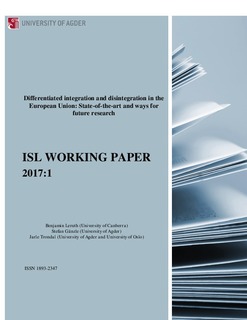Differentiated integration and disintegration in the European Union : State-of-the-art and ways for future research
Working paper
Published version

View/
Date
2017Metadata
Show full item recordCollections
- ISL Working Papers [29]
Abstract
Following the United Kingdom (UK)’s vote to leave the European Union (EU) on 23 June 2016, the process of European integration is now at a critical juncture. Leaving aside Greenland’s departure from the European Community in 1983 – because of its political union with Denmark, Greenland has been recognized as one of the Overseas Countries and Territories of the EU –, the United Kingdom is the first member state in the history of European integration to engage in a process of disintegration which may ultimately see full withdrawal from the EU in the spade of two years following the UK’s trigger of Article 50 TEU. This means that a new chapter in the rich literature on differentiated European integration is going to be opened. Obviously, the dusk has yet to settle before the impact on both the EU and the UK will become discernible and the future shape of the UK-EU relationship in the post-Brexit era will finally appear. Thus, it is a timely task for practitioners and scholars of various EU-related disciplines to ponder what the implications for the future of European integration are in more genuinely. Has European integration reached a tipping and is interstate cooperation reverting to the ‘old normal’ of intergovernmental relations of ‘sovereign states’ constituting the bedrock of international relations? We are convinced that, now more than ever, academics from different sub-fields of European studies and stakeholders should be brought together in order to discuss the causes and consequences of Brexit. It is through interdisciplinary co-operation that researchers will be able to fully grasp the new developments across and beyond Europe. To this end the Collaborative Research Network (CRN) on ‘Differentiated integration in the European Union after Brexit’ has been launched under the auspices of the University Association for Contemporary European Studies (UACES). It has been co-founded and directed by the authors of this working paper. The CRN aims at enabling such discussion between academics, stakeholders and practitioners.
Description
Presentation on department page: http://www.uia.no/no/portaler/om_universitetet/oekonomi_og_samfunnsvitenskap/statsvitenskap_og_ledelsesfag/ forskning_isl/isl_working_papers_series